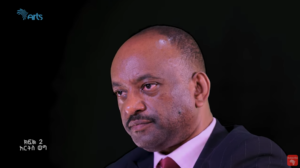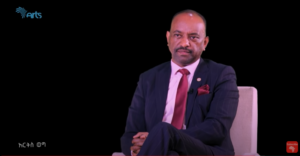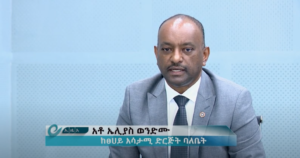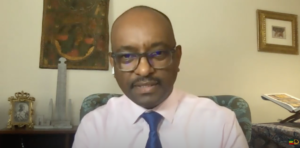LA WEEKLY – The annual literary supplement entitled “Publish or Perish: LA’s burgeoning publishing scene” featured profiles of 18 independent presses, including Tsehai Publishers, Santa Monica Press, Bukamerica, Red Hen Press, Angel City Press and Tam Tam Books are the few.
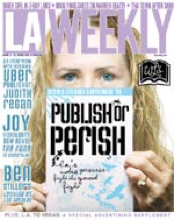 Elias Wondimu is no stranger to committing himself, taking risks and addressing difficult truths. Born in 1973 in Addis Ababa, Wondimu worked as a journalist and activist until he was threatened with political retribution. After coming to the U.S. for a conference in 1994, he decided to stay. “You are faced with two choices,” he says. “First, you are doomed never to see any of your family or, second, you die.”
Elias Wondimu is no stranger to committing himself, taking risks and addressing difficult truths. Born in 1973 in Addis Ababa, Wondimu worked as a journalist and activist until he was threatened with political retribution. After coming to the U.S. for a conference in 1994, he decided to stay. “You are faced with two choices,” he says. “First, you are doomed never to see any of your family or, second, you die.”
After seven years as managing editor of the Ethiopian Review, the premier magazine on Ethiopian issues outside the country, Wondimu realized a need for works about Africa for the general reader — especially after Heinemann’s African Writers Series, which had introduced African literature to Western readers since 1962, folded in 2003. Following a move to Los Angeles, Wondimu created Tsehai Publishers and Distributors, which has become a vital and indispensable resource. As publisher, Wondimu has assumed the role of cultural ambassador, establishing lines of dialogue between African scholars, poets and historians, academics and aesthetes, journalists and scholars — and the voices from many local and international communities past and present.
Since 1998, Tsehai has released a diverse list of titles addressing the complex and misrepresented history and culture of Ethiopia, a country once known as Abyssinia and dubbed a “Christian island in a Muslim sea.” These books, which include the first English translation of the 17th-century Futuh Al-Habasha (The Conquest of Abyssinia), provide a necessary counterpoint to representations of Ethiopia by such Western writers as Evelyn Waugh and Ryszard Kapuscinski. But other countries are represented as well: This month, Wondimu publishes Robert O. Collins’ essay collection Civil Wars and Revolution in the Sudan. Future Tsehai publications will include the classic Ethiopian novel Fikir Eske Mekabir (Love Unto the Grave), by the country’s beloved novelist and statesman Addis Alemayehu, as well as an anthology of African-American poets from Los Angeles’ Leimert Park neighborhood.
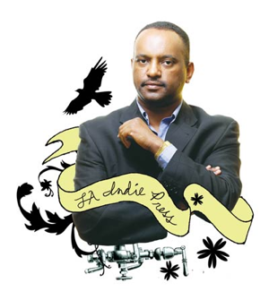 A gregarious and fervent conversationalist who communicates an incomparable passion for both the intellectual and political importance of his work, Wondimu also publishes the International Journal of Ethiopian Studies (IJES), oversees the news-and-information Web site Africantribune.com, and serves on the board of PEN USA. Yet he manages to find time to play an active role in L.A.’s Ethiopian community at large. For those who take notice of the Ethiopian presence in Los Angeles, only in Fairfax’s “Little Ethiopia,” Wondimu explains that the city has the second-largest Ethiopian exile community (after Washington, D.C.) in America — and it’s represented across L.A.: “The Ethiopian community is not a segregated community. They live everywhere from Beverly Hills to South-Central.” What’s more, he notes, “Ethiopia is the first African country to be named as a part of a city, any city, in the U.S.”
A gregarious and fervent conversationalist who communicates an incomparable passion for both the intellectual and political importance of his work, Wondimu also publishes the International Journal of Ethiopian Studies (IJES), oversees the news-and-information Web site Africantribune.com, and serves on the board of PEN USA. Yet he manages to find time to play an active role in L.A.’s Ethiopian community at large. For those who take notice of the Ethiopian presence in Los Angeles, only in Fairfax’s “Little Ethiopia,” Wondimu explains that the city has the second-largest Ethiopian exile community (after Washington, D.C.) in America — and it’s represented across L.A.: “The Ethiopian community is not a segregated community. They live everywhere from Beverly Hills to South-Central.” What’s more, he notes, “Ethiopia is the first African country to be named as a part of a city, any city, in the U.S.”
In the Ethiopian national language of Amharic, the word “tsehai” means “sun,” suggesting illumination or enlightenment, but it carries a more personal meaning for Wondimu. It is the name of his mother, who died in Ethiopia in 1997. Though he could not return to Africa for her funeral, Wondimu says that he never forgets that “the press carries my mother’s name.” Wondimu’s father, brother and sister are now actively engaged in the company. “Without the family and friends around me,” he says, “I couldn’t have done this. From a personal passion, it has now become a family business.”
That family has extended to a close-knit circle of African exiles and expatriates who are also writers, artists, journalists and scholars. One of Wondimu’s close friends in Los Angeles is Chris Abani, the Nigerian-born professor of creative writing, poet and author of the recently published novel GraceLand. Abani, who also left Africa to escape further political persecution, contributed to the first issue of IJES (the second comes out next month) and has worked closely with Wondimu. Abani says that they came together out of their mutual interest “in responding to the dearth of African voices in the contemporary canon.”
“Elias is doing something unusual and important,” says Wendy Belcher, a writer, UCLA lecturer and scholar who grew up in Ethiopia and serves on the editorial board of the IJES. “There are very few publishers from the African continent, and, in the U.S., there are [only] a handful which are run by Africans and are publishing African texts. For an Ethiopian to have a press is more appropriate than almost any other nationality. They’ve had a written language going back 3,000 years and have long been in the business of printing and preserving the written word. He’s in a long, honorable line.”
Wondimu is emboldened by recent changes he sees in the popular perception of Ethiopia. “With what happened in the last 10 years in Ethiopia — a civil war with Eritrea, a famine — you don’t expect a publisher to take a positive book, because the market is not there. I don’t see that now; things are changing for the better. We have an opportunity to show the world what Ethiopia is. If I can do that, I will be happy.”
SOURCE: Anthony Miller, LA Weekly

